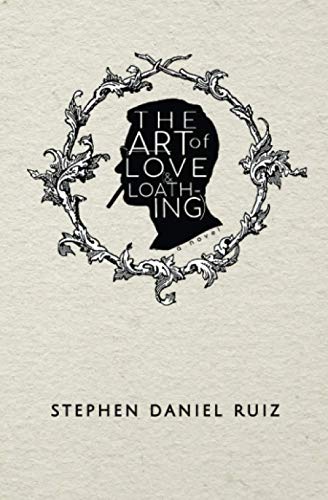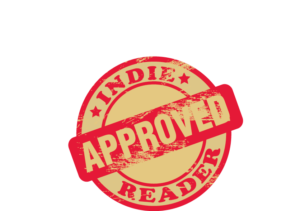The Art of Love (& Loathing) received a 4+ star review, making it an IndieReader Approved title.
Following find an interview with author Stephen Daniel Ruiz.
What is the name of the book and when was it published?
The name of my novel is The Art of Love (& Loathing), and I published it on December 16th of 2019.
What’s the book’s first line?
“Every year, thirteen people are crushed to death by vending machines.”
What’s the book about? Give us the “pitch”.
The Art of Love (& Loathing) is about a middle-aged writer named Arthur Kimble who is not-so-successfully battling his addiction to alcohol and pills, is struggling to find any inspiration to write, and is—in his opinion—failing at the one thing that is most important to him: being a father. It seems that each of his attempts to get his life together is foiled either by his self-sabotaging behavior or his inability to accept the changes taking place in his life. However, he holds onto the love he has for his children and the idea that life can somehow be willed into returning to the way things were. Over time, he comes to realize that perhaps life wasn’t all that he believed it to be, and he must make decisions that will lead either to his healing and ascension or to his ultimate demise.
What inspired you to write the book? A particular person? An event?
While this is in no way some fictionalized memoir of my personal life, my initial inspiration for the protagonist Arthur Kimble came from the idea that I could create a person who understood my own experiences, except that—very much unlike real life—I actually had control over what happens to him. Through the 5 years it took to write this book, Arthur became a kindred spirit to me, a best friend, someone who was right there in the trenches of my life as I personally struggled with my own addiction to alcohol and all the problems that accompanied it. Ironically, I came to realize that I had little control over the outcome of the story as the characters told me what happened more than I decided what they did. Learning to deal with this acceptance helped me deal with acceptance in my own life.
What’s the main reason someone should really read this book?
I believe there’s a character in this book that each individual can relate to, not necessarily just Arthur Kimble, but in other characters as well. It could be Arthur’s girlfriend Vivian who is trying to be supportive without enabling him, or his close friend Samwell who feels he is walking a tight rope between being a true friend who is honest and being so honest that it severs their friendship completely. There are the kids, Ryan and Abi, who are caught in the middle of a divorce, feeling compelled to take sides. There’s Julia, Arthur’s ex-wife, who hates being perceived as the bad guy despite having her own reasons for being bitter. The list goes on. Bottomline, everyone in the story learns something about themselves. Everyone evolves through the difficulties. If that isn’t relatable, then what is?
What’s the most distinctive thing about the main character? Who-real or fictional-would you say the character reminds you of?
The most distinctive feature of Arthur Kimble, in my opinion, is his cynical hopefulness. Throughout the book, it’s very clear that Arthur is jaded, but his hope in the future is a blaring contrast to that, keeping alive the possibility that this man could still be saved, that just maybe it’s not too late. But as the author, I don’t know if Arthur Kimble reminds me of anyone besides Arthur Kimble. He’s just too real to me to compare with someone else. Perhaps the readers will be able to draw their own real-life comparisons. It’s a special thing.
If they made your book into a movie, who would you like to see play the main character(s)?
I’ve gone back and forth about who might play Arthur Kimble or any of the other characters. I’d rather not say who to avoid taking that privilege away from any readers. However, I will say that I sometimes imagine Benedict Cumberbatch voicing Huxley, but that guy could literally voice Winnie the Pooh, and I’d be cool with it.
When did you first decide to become an author?
Truthfully, I didn’t decide to become an author until after I started writing The Art of Love (& Loathing). I’d already been writing for most of my life, but never with the intention of publishing anything.
Is this the first book you’ve written?
The Art of Love (& Loathing) is my first novel, though certainly not my last.
What do you do for work when you’re not writing?
I am a private piano and songwriting instructor, and for the majority of the time that I was writing this novel, I also worked in warehouses for two companies which shall remained unnamed.
How much time do you generally spend on your writing?
I spend as much time as I can without making it an unhealthy obsession (which it very easily could be if I’m not careful). I do alternate between writing stories and songwriting, just for my sanity. If I go any long period of time without creating something, I get cranky. Very cranky. On the other side of the coin, you have to feed your creativity and imagination by experiencing other people’s art, whatever the medium. You’ll burn out quickly if you don’t.
What’s the best and the hardest part of being an indie?
The hardest part of being an indie is remaining objective about your own work. You finish writing this paragraph or chapter or song that feels like the greatest thing you’ve ever written. There’s no way it could need editing. But alas, there is always room for improvement, and you must be able to put aside how you feel about the piece in order to view it the way everyone else is going to; to be able to see the individual trees that make the forest, so to speak. There isn’t anyone else being paid to tell you the truth about one thing or another or who’s going to do the work for you. I’m very fortunate to have someone in my life who is willing to tell me what’s what, but that doesn’t always mean we agree, and it doesn’t make changing something any easier.
What’s a great piece of advice that you can share with fellow indie authors?
Don’t ever assume that it’s too late to make improvements on your work and your strategy. It’s not.
Would you go traditional if a publisher came calling? If so, why?
No, because we wouldn’t share the same bottom line. I’m also a control freak.
Is there something in particular that motivates you (fame? fortune?)
My primary motivation is to challenge the audience, to offer an alternative point of view about something and for them to actually look at it and think. I want that whole chain reaction. I want to know that what I’m putting down is being picked up. Whether they agree with what I’m saying or not doesn’t matter. They still thought about it. If this isn’t happening, however, then all the fame and fortune in the world doesn’t mean jack.
Which writer, living or dead, do you most admire?
My favorite authors are Aldous Huxley and John Steinbeck. Equally. Huxley wrote and shared ideas beyond what was considered acceptable or comfortable and never failed to bring a new perspective to the lens. Steinbeck’s writing is simply beautiful; he makes it so personal and intimate. I aspire for my writing to be a mixture of the two ofa them.
Which book do you wish you could have written?
East of Eden. If you don’t know why, then you’ve never read it.

